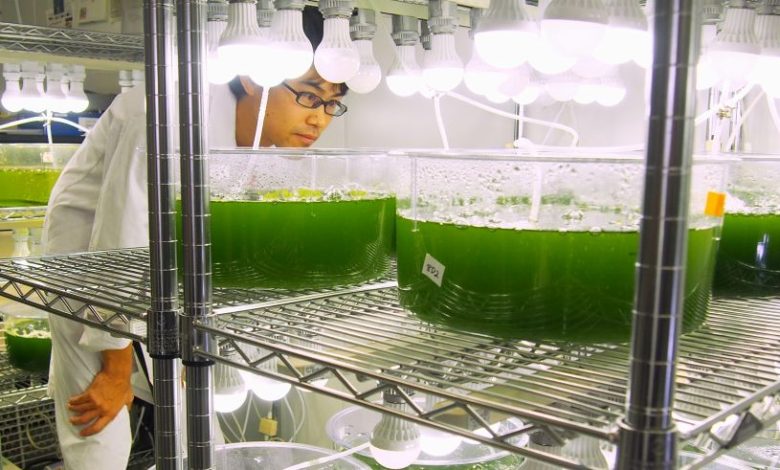Algae-Based Biofuels: Powering the Future Sustainably

The global energy landscape is evolving rapidly, driven by the urgency to reduce greenhouse gas emissions, combat climate change, and ensure energy security for future generations. Algae-based biofuels, often called the “third-generation biofuels,” have gained significant attention for their potential to provide cleaner and more sustainable energy solutions. Unlike traditional biofuels made from crops like corn or sugarcane, algae-based biofuels harness the remarkable photosynthetic capabilities of microalgae to produce energy-rich oils. These oils can be processed into biodiesel, jet fuel, and even bioethanol, offering versatility in their applications.
Moreover, algae thrive on sunlight, carbon dioxide, and water—ingredients that are both abundant and inexpensive. This means that algae-based biofuels can be produced without competing with food crops or depleting valuable agricultural land. As we dive deeper into this transformative energy source, let’s explore Greenideasproducts for more green solutions to reduce your environmental footprint.
What Are Algae-Based Biofuels?
These are renewable energy sources derived from the lipids (oils) found in certain types of algae. Microalgae, in particular, have shown immense potential for biofuel production due to their rapid growth rates and high lipid content. Algae absorb carbon dioxide during photosynthesis and convert it into biomass, which can be processed into various types of biofuels, such as:
- Biodiesel: Derived from algae oils through a process called transesterification.
- Bioethanol: Produced by fermenting the carbohydrates in algae.
- Jet Fuel: Processed to meet aviation industry requirements, reducing emissions.
The beauty of algae-based biofuels lies in their ability to grow in non-arable land, freshwater, saltwater, or even wastewater, making them an incredibly adaptable energy solution. For those looking to make eco-friendly choices at home, products like eco wall paint are great options. Click on https://greenideasproducts.com/reviews/breathing-easy-and-living-green-a-guide-to-eco-friendly-wall-paints/ here for eco wall paint to learn how small changes in your home can create a big impact on the environment.
Why Are They Gaining Attention?
As the world grapples with the dual challenges of energy scarcity and environmental degradation, they have become a beacon of hope. Here’s why they stand out:
- Sustainability: Algae can be grown in areas unsuitable for traditional crops, minimizing land-use conflicts.
- Carbon Neutrality: Algae absorb CO2 during growth, offsetting the emissions from biofuel combustion.
- High Yield: Algae can produce up to 30 times more energy per acre than traditional biofuel crops like soy or corn.
According to a study published in Nature Sustainability, algae-based biofuels could reduce greenhouse gas emissions by up to 70% compared to fossil fuels.
The Science Behind Algae Biofuel Production
Producing algae-based biofuels is a multi-step process that involves:
Cultivation: Scientists grow algae in controlled environments, such as open ponds or photobioreactors, under optimal conditions for rapid biomass production.
Harvesting: The algae are separated from the water using techniques like centrifugation or flocculation.
Lipid Extraction: Oils are extracted from algae cells, either chemically or mechanically, for biofuel production.
Refinement: Chemical processes like transesterification convert the extracted oils into biodiesel, while fermentation transforms other components into ethanol or other fuels.
Benefits

Environmental Impact
They contribute to significant reductions in greenhouse gas emissions, helping to mitigate the effects of global warming. A report from the U.S. Department of Energy highlights that algae biofuels have the potential to replace up to 17% of the United States’ imported oil.
Economic Advantages
The scalability of algae cultivation and the potential to use non-potable water sources make it an economically attractive option. Furthermore, the byproducts of algae processing, such as animal feed or bioplastics, add revenue streams for producers.
Energy Security
By reducing dependence on fossil fuels, algae-based biofuels enhance energy security, ensuring a steady and renewable supply of energy for the future.
Challenges Facing Algae-Based Biofuels
While the potential of algae biofuels is enormous, several challenges remain:
Cost of Production
Scaling up algae cultivation and processing to commercial levels remains expensive. To bring costs down, we need advanced technologies and research.
Energy Intensity
Harvesting and lipid extraction processes consume significant amounts of energy, impacting the overall carbon footprint.
Infrastructure Compatibility
Adapting existing fuel infrastructure to accommodate algae-based biofuels requires investments and policy support.
Innovations Driving the Future of Algae Biofuels
Recent innovations are addressing these challenges head-on. Advances in genetic engineering, for instance, have led to the development of algae strains with higher lipid content and faster growth rates. Similarly, the use of AI and automation in algae cultivation is optimizing resource use and reducing operational costs.
The aviation industry is also exploring algae-based jet fuels, with companies like Boeing and United Airlines investing in research to achieve carbon-neutral flights.
You Might Enjoy: What is the difference between thermal spray and plasma spray?
FAQs
How are algae-based biofuels better than traditional fossil fuels?
They are renewable, produce fewer emissions, and don’t compete with food production, making them more sustainable than fossil fuels.
What makes algae a good candidate for biofuel production?
Algae grow quickly, require minimal resources, and can thrive in non-arable areas, offering high yields of oil per acre.
Are algae-based biofuels commercially available?
While still in the early stages of commercialization, several pilot projects and companies are scaling up algae biofuel production.
What are the environmental benefits of algae biofuels?
Algae biofuels reduce greenhouse gas emissions, utilize CO2 during growth, and minimize land and water usage compared to other biofuels.
What are the challenges of algae biofuel production?
The high cost of production, energy-intensive processes, and scalability remain key challenges in the commercial adoption of them.
Can algae biofuels replace fossil fuels entirely?
While they hold immense potential, algae biofuels are likely to complement other renewable energy sources in reducing dependence on fossil fuels.
Conclusion
These are no longer a distant dream—they are a tangible solution to the world’s pressing energy and environmental challenges. By offering a renewable, scalable, and eco-friendly alternative, they have the potential to revolutionize how we think about energy. Although challenges remain, ongoing innovations and investments are bringing algae biofuels closer to widespread adoption. With global support and awareness, algae-based biofuels could power a sustainable future for generations to come.

